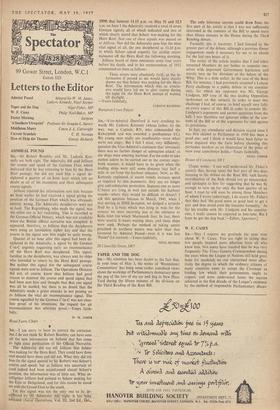SIR,—Vice-Admiral Durnford is very crushing to- wards Mr. Ludovic Kennedy
(whose father, by the way, was a Captain, RN, who commanded the Rawalpindi and was awarded a posthumous VC). We young men really are insufferable—even when we're not angry. But I feel I must, very diffidently, question the Vice-Admiral's statement that `obviously there was no further danger of submarine attack' as the ships were entering harbour. For the order to take station astern to be carried out in the correct copy- book manner, it would have to be given when the leading ships were still some distance (say half a mile or so) from the harbour entrance. Now, as Mr. Kennedy explained, if escort vessels increase speed as required by this manoeuvre, they can no longer give anti-submarine protection. Suppose one or more U-boats are lying in wait just outside the harbour mouth—where they would be difficult to detect? I ask this question because in March. 1945, when I was scrving,in HMS Scorpion, we dodged a torpedo fired by a U-boat which was lying in wait for the convoy we were escorting just at the entrance to Kola inlet (on which Murmansk lies). In fact, there were several U-boats waiting there, and three ships were sunk. Perhaps the method of taking astern practised in northern waters was safer than that favoured by Admiral Pound—even it it was less `Pusser' (i.e. correct).—Yours faithfully,


































 Previous page
Previous page